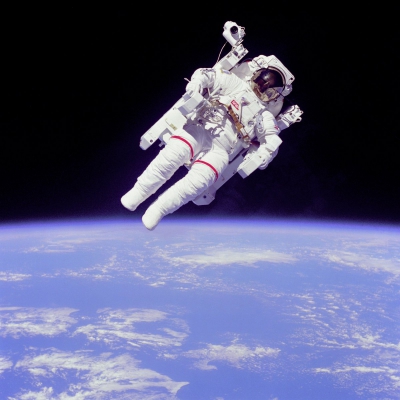Apollo 1, initially designated AS-204, was the first crewed mission of the Apollo program, the American undertaking to land the first man on the Moon. It was planned to launch on February 21, 1967, as the first low Earth orbital test of the Apollo command and service module. The mission never flew; a cabin fire during a launch rehearsal test at Cape Kennedy Air Force Station Launch Complex 34 on January 27 killed all three crew membersCommand Pilot Gus Grissom, Senior Pilot Ed White, and Pilot Roger B. Chaffeeand destroyed the command module (CM). The name Apollo 1, chosen by the crew, was made official by NASA in their honor after the fire.
Immediately after the fire, NASA convened an Accident Review Board to determine the cause of the fire, and both chambers of the United States Congress conducted their own committee inquiries to oversee NASA's investigation. The ignition source of the fire was determined to be electrical, and the fire spread rapidly due to combustible nylon material and the high-pressure pure oxygen cabin atmosphere. Rescue was prevented by the plug door hatch, which could not be opened against the internal pressure of the cabin. Because the rocket was unfueled, the test had not been considered hazardous, and emergency preparedness for it was poor.
During the Congressional investigation, Senator Walter Mondale publicly revealed a NASA internal document citing problems with prime Apollo contractor North American Aviation, which became known as the Phillips Report. This disclosure embarrassed NASA Administrator James E. Webb, who was unaware of the document's existence, and attracted controversy to the Apollo program. Despite congressional displeasure at NASA's lack of openness, both congressional committees ruled that the issues raised in the report had no bearing on the accident.
Crewed Apollo flights were suspended for twenty months while the command module's hazards were addressed. However, the development and uncrewed testing of the lunar module (LM) and Saturn V rocket continued. The Saturn IB launch vehicle for Apollo 1, SA-204, was used for the first LM test flight, Apollo 5. The first successful crewed Apollo mission was flown by Apollo 1's backup crew on Apollo 7 in October 1968.
An astronaut (from the Ancient Greek ἄστρον (astron), meaning 'star', and ναύτης (nautes), meaning 'sailor') is a person trained, equipped, and deployed by a human spaceflight program to serve as a commander or crew member aboard a spacecraft. Although generally reserved for professional space travelers, the term is sometimes applied to anyone who travels into space, including scientists, politicians, journalists, and tourists."Astronaut" technically applies to all human space travelers regardless of nationality or allegiance; however, astronauts fielded by Russia or the Soviet Union are typically known instead as cosmonauts (from the Russian "kosmos" (космос), meaning "space", also borrowed from Greek) in order to distinguish them from American or otherwise NATO-oriented space travellers. Comparatively recent developments in crewed spaceflight made by China have led to the rise of the term taikonaut (from the Mandarin "tàikōng" (太空), meaning "space"), although its use is somewhat informal and its origin is unclear. In China, the People's Liberation Army Astronaut Corps astronauts and their foreign counterparts are all officially called hángtiānyuán (航天员, meaning "heaven navigator" or literally "heaven-sailing staff").
Since 1961, 600 astronauts have flown in space. Until 2002, astronauts were sponsored and trained exclusively by governments, either by the military or by civilian space agencies. With the suborbital flight of the privately funded SpaceShipOne in 2004, a new category of astronaut was created: the commercial astronaut.

1967Jan, 27
Astronauts Gus Grissom, Edward White and Roger Chaffee are killed in a fire during a test of their Apollo 1 spacecraft at the Kennedy Space Center, Florida.
Choose Another Date
Events on 1967
- 15Jan
Green Bay Packers
The first Super Bowl is played in Los Angeles. The Green Bay Packers defeat the Kansas City Chiefs 35-10. - 28Apr
Muhammad Ali
Vietnam War: Boxer Muhammad Ali refuses his induction into the United States Army and is subsequently stripped of his championship and license. - 30May
Nigerian Civil War
The Nigerian Eastern Region declares independence as the Republic of Biafra, sparking a civil war. - 7Jun
Jerusalem
Six-Day War: Israeli soldiers enter Jerusalem. - 2Nov
Lyndon B. Johnson
Vietnam War: US President Lyndon B. Johnson and "The Wise Men" conclude that the American people should be given more optimistic reports on the progress of the war.

 English
English  español
español  français
français  português
português  русский
русский  العربية
العربية  简体中文
简体中文 